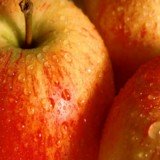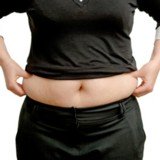Chicken Nutrition Facts
Chicken Nutrition Facts Potassium and Health Benefits
 Chicken is one of the most common food source of protein across the globe. In fact, in the meats group, it is the preferred choice over red meat for your source of protein, especially when you are considering healthy eating. One of the reasons for this is because it is leaner and contains less saturated fat and cholesterol than most red meats. The chicken breast in particular is the leanest part of chicken. It contains less than half the amount of fat found in a high quality t-bone steak that has been trimmed of extra fat! However, there is a catch with chicken. It's skin contains quite a bit of saturated fat and cholesterol, therefore it is advised to remove the skin when you're thinking of eating healthy.
Chicken is one of the most common food source of protein across the globe. In fact, in the meats group, it is the preferred choice over red meat for your source of protein, especially when you are considering healthy eating. One of the reasons for this is because it is leaner and contains less saturated fat and cholesterol than most red meats. The chicken breast in particular is the leanest part of chicken. It contains less than half the amount of fat found in a high quality t-bone steak that has been trimmed of extra fat! However, there is a catch with chicken. It's skin contains quite a bit of saturated fat and cholesterol, therefore it is advised to remove the skin when you're thinking of eating healthy.
For most people, that chicken skin is delicious, it adds a crunchy-ness to the meat especially when it has been roasted. You may consume some once in a while but if you have some health issues such as high blood pressure, you may want to stay clear of it altogether. Chicken, like eggs is not only a good source of Protein, but of the mineral Selenium and the B-Vitamin Niacin also. Both Selenium and Niacin help to prevent cancer. Selenium has many functions in the body including boosting your immune system and the metabolism of the thyroid hormone. Another excellent source of selenium is salmon, mackerel and other oily fish.
The B-Vitamins combination found in chicken serve a great purpose. Niacin is responsible for the conversion of your body's fats ,carbohydrates and proteins into usable energy. It also aids in blood sugar regulation. This means chicken will be a good meat choice for those who are diabetic to add it to their diabetic nutrition plan. Vitamin B6, also provided in excellent sources by chicken, is responsible for the breakdown of glycogen. Glycogen is the form in which sugar is stored in your body, in your muscle cells to be specific. Chicken nutrition facts have shown that in most cases it is a good source of Potassium. Potassium is a mineral maintains the body's water balance and helps to lower blood pressure for those people who suffer from hypertension. Other food sources of potassium include most fresh fruits and vegetables such as bananas, strawberries, apples, oranges, avocados, celery, carrots, spinach, potatoes and many others. You may also get potassium in meats, milk and other dairy products such as yogurt and ice-cream.
Generally speaking, amongst the meats, chicken is one of the most versatile foods there are. Just like potatoes in the vegetables food group. Chicken can be boiled, roasted, grilled, fried, poached or stewed. We will now take a look at some chicken nutrition facts of chicken prepared in different ways. The percent daily values (DV) are based on a 2,000 calorie diet. Your values may be higher or lower depending on your daily calorie needs. Be careful when handling chicken as it is very sensitive to heat.
If you want to defrost it or marinate it, you would rather do it in the refrigerator to avoid spoilage and cases of salmonella. When you want to grill your chicken, you may serve it together with cruciferous vegetables such as broccoli, kale, cauliflower or cabbage. This is because they have the ability to increase your body's ability to detoxify carcinogenic (cancer causing) compounds which are produced when meat is grilled or barbecued.
Grilled, Baked, Broiled, Roasted Chicken Nutrition Facts
Baked, grilled, roasted or broiled chicken is more or less one in the same thing, just difference in terminology. According to these nutrition facts chicken that is prepared in this way is low to moderate in terms of its calories, total fat, saturated fat, cholesterol and sodium content. It is also a source of Protein, Carbohydrates, Vitamin A and a good source of Calcium.
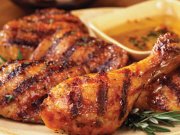
- Serving size- 1 serving
- Calories- 140
- Calories from Fat- 45
- Total Fat- 5g, 8% DV
- Saturated Fat- 3g, 15% DV
- Trans Fat- 0g
- Cholesterol- 30mg,10% DV
- Sodium- 95mg, 4% DV
- Total Carbohydrate- 21g, 7% DV
- Dietary Fiber- 0g
- Sugars- 16g
- Protein- 3g, 6% DV
- Vitamin A- 6% DV
- Vitamin C- 0% DV
- Calcium- 10% DV
- Iron- 0% DV
Rotisserie Chicken Nutrition Facts
When compared to the grilled chicken, the rotisserie chicken nutrition facts show that it is slightly higher in its calories and a lot higher in its total fat, saturated fat, cholesterol and sodium content. It however is a very good source of Protein, providing you with 32% of your daily recommended daily allowance of the nutrient.
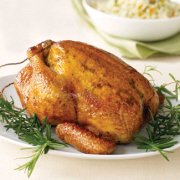
- Serving size- 3 oz (85g)
- Calories- 170
- Total Fat- 12g, 19% DV
- Saturated Fat- 3.5g, 18% DV
- Trans Fat- 0g
- Cholesterol- 80mg, 27% DV
- Sodium- 280mg, 12% DV
- Total Carbohydrate- 0g
- Dietary Fiber- 0g
- Sugars- 0g
- Protein- 16g, 32% DV
- Vitamin A- 0% DV
- Vitamin C- 0% DV
- Calcium- 0% DV
- Iron- 0% DV
Trader Joe's Mandarin Chicken Nutrition Facts
Trader Joe's Mandarin chicken is also higher in calories than the roast chicken and rotisserie chicken. It is also a very good source of Protein as well as being a source of Carbohydrates, Vitamin A, Vitamin C and Iron.
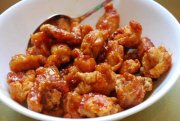
- Serving size- 1 cup (150g)
- Calories- 230
- Calories From Fat- 70
- Total Fat- 8g, 12% DV
- Saturated Fat- 2g, 10% DV
- Trans Fat- 0g
- Cholesterol- 70mg, 23% DV
- Sodium- 320mg, 13% DV
- Total Carbohydrate- 19g, 6% DV
- Dietary Fiber- 0g
- Sugars- 8g
- Protein- 16g, 32% DV
- Vitamin A- 2% DV
- Vitamin C- 0% DV
- Calcium- 2% DV
- Iron- 8% DV
Sesame Chicken Nutrition Facts
Usually sesame chicken is made by battering and deep-frying chicken pieces. After it's been fried, it's then covered with a sauce that is made up od chicken broth, sugar, vinegar, corn starch and sake. The chicken is then topped with sesame seeds and may be served with rice and broccoli. Sesame chicken is quite similar to General Tso's chicken.
The health benefits of sesame seeds include promoting good bone health, preventing colon cancer, PMS, Migraines and hypertension amongst many other things. This is due to its many beneficial minerals. Sesame chicken nutrition facts reveal that it is an excellent source of Protein and a source of Vitamins A and C, Calcium and Iron. You may need to watch out for the sodium and cholesterol content.
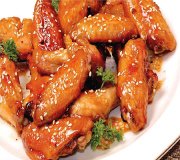
- Serving size- 1 cup (225g)
- Calories- 330
- Calories from Fat- 80
- Total Fat- 9g, 14% DV
- Saturated Fat- 2g, 10% DV
- Trans Fat- 0g
- Cholesterol- 75mg, 25% DV
- Sodium- 700mg, 29% DV
- Total Carbohydrate- 31g, 10% DV
- Dietary Fiber- 0g
- Sugars- 22g
- Protein- 30g, 60% DV
- Vitamin A- 2% DV
- Vitamin C- 8% DV
- Calcium- 2% DV
- Iron- 10% DV
Boiled Chicken Nutrition Facts
These are nutrition facts for a boiled chicken breast. They reveal that it is low in total fat and do not contain any saturated fat, cholesterol or sodium. It is basically an excellent source of Protein, providing you with an awesome 86% of your recommended daily allowance of the nutrient.
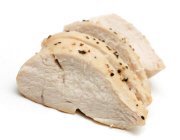
- Serving size- 1 serving
- Calories- 204
- Calories from Fat- 18
- Total Fat- 2g, 3% DV
- Saturated Fat- 0g
- Trans Fat- 0g
- Cholesterol- 0mg
- Sodium- 0mg
- Total Carbohydrate- 0g
- Dietary Fiber- 0g
- Sugars- 0g
- Protein- 43g, 86% DV
- Vitamin A- 0% DV
- Vitamin C- 0% DV
- Calcium- 0% DV
- Iron- 0% DV
Chicken Nutrition Facts: Breast
Roasted chicken breast nutrition facts (meat only). It is moderate in terms of its calories and is also an absolutely excellent source of Protein (87% of your Daily Value), Niacin (96% of your Daily Value), Vitamin B6 (42% of your Daily Value) and Selenium (55% of your Daily Value). It is also a source of many other minerals, vitamins and nutrients.
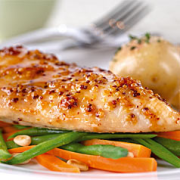
- Serving size- 1 cup (140g)
- Calories- 231
- Calories from Fat- 45
- Total Fat- 5g, 8% DV
- Saturated Fat- 1g, 7% DV
- Trans Fat- 0g
- Cholesterol- 119mg, 40% DV
- Sodium- 104mg, 4% of DV
- Total Carbohydrate- 0g
- Dietary Fiber- 0g
- Sugars- 0g
- Protein- 43g, 87% DV
- Vitamin A- 1% DV
- Vitamin C- 0% DV
- Calcium- 2% DV
- Iron- 8% DV
- Vitamin E- 2% DV
- Vitamin K- 1% DV
- Thiamin- 7% DV
- Riboflavin- 9% DV
- Niacin- 96% DV
- Vitamin B6- 42% DV
- Folate- 1% DV
- Vitamin B12- 8% DV
- Pantothenic Acid- 14% DV
- Magnesium- 10% DV
- Phosphorus- 32% DV
- Potassium- 10% DV
- Zinc- 9% DV
- Copper- 3% DV
- Manganese- 1% DV
- Selenium- 55% DV
Chicken Nutrition Facts: Thigh
This chicken thigh has been de-boned and the skin has been removed. These chicken nutrition facts reveal that it is on the moderate side in terms of its total fat, saturated fat, cholesterol and sodium. It is also a good source of Protein.

- Serving size- 1 small thigh
- Calories- 95
- Calories from Fat- 45
- Total Fat- 5g, 8% DV
- Saturated Fat- 1.3g, 7% DV
- Trans Fat- 0g
- Cholesterol- 43mg, 14% DV
- Sodium- 189mg, 8% of DV
- Potassium- 109mg- 3% DV
- Total Carbohydrate- 0g
- Dietary Fiber- 0g
- Sugars- 0g
- Protein- 12g, 24% DV
- Vitamin A- 0% DV
- Vitamin C- 0% DV
- Calcium- 1% DV
- Iron- 3% DV
Chicken Nutrition Facts: Salad
Chicken or turkey salad is one of those salads that are high in calories. This is obviously due to the chicken or turkey. It is fairly high in its total fat and cholesterol content. It is however obviously an excellent source of Protein (60% of your Daily Value).

- Serving size- 1 cup
- Calories- 417
- Calories from Fat- 284
- Total Fat- 32g, 48% DV
- Saturated Fat- 6g, 28% DV
- Trans Fat- 0g
- Cholesterol- 100mg, 33% DV
- Sodium- 288mg, 12% of DV
- Potassium- 319mg- 9% DV
- Total Carbohydrate- 1g, 4% DV
- Dietary Fiber- 0.7g, 3% DV
- Sugars- 1g
- Protein- 30g, 60% DV
- Vitamin A- 0% DV
- Vitamin C- 2% DV
- Calcium- 4% DV
- Iron- 8% DV
Fried Chicken Nutrition Facts
These are nutrition facts for a fried drumstick without any coating with the skin eaten. It is moderate in terms of its calories, total fat, saturated fat and sodium. These chicken nutrition facts for a fried drumstick show that it will provide you with 27% of your recommended daily value of Protein and is also a source of Calcium, Iron and Potassium.
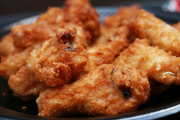
- Serving size- 1 medium drumstick (after cooking and de-boning)
- Calories- 119
- Calories from Fat- 61
- Total Fat- 6.79g, 10% DV
- Saturated Fat- 1.7g, 8% DV
- Trans Fat- 0g
- Cholesterol- 56mg, 19% DV
- Sodium- 211mg, 9% of DV
- Total Carbohydrate- 0g
- Dietary Fiber- 0g
- Sugars- 0g
- Protein- 13.6g, 27.2% DV
- Vitamin A- 0% DV
- Vitamin C- 0% DV
- Calcium- 1% DV
- Iron- 4% DV
- Potassium- 116mg, 3% DV
Chicken Nutrition Facts: Drumstick
A de-boned chicken drumstick with its skin removed is low in calories, total fat, saturated fat and sodium. It is also a good source of protein.

- Serving size- 1 medium (after cooking, skin and bone removed)
- Calories- 72
- Calories From Fat- 21
- Total Fat- 2.36g, 4% DV
- Saturated Fat- 0.6g, 3% DV
- Trans Fat- 0g
- Cholesterol- 39mg, 13% DV
- Sodium- 175mg, 7% DV
- Total Carbohydrate- 0g
- Dietary Fiber- 0g
- Sugars- 0g
- Protein- 12g, 24% DV
- Vitamin A- 0% DV
- Vitamin C- 0% DV
- Calcium- 0% DV
- Iron- 3% DV
Chicken Nutrition Facts: Chicken Lo Mein
Chicken Lo mein is one of the common chinese foods. It is moderate to high in terms of its calories. It is a good source of Dietary fiber which amongst other things helps to keep your digestive system in good health. Chicken Lo mein is also a good source of Vitamin C, Iron, Potassium and Protein.
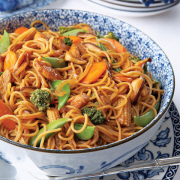
- Serving size- 1 cup
- Calories- 278
- Calories from Fat- 83
- Total Fat- 9g, 14% DV
- Saturated Fat- 2g, 10% DV
- Trans Fat- 0g
- Cholesterol- 26mg, 9% DV
- Sodium- 536mg, 22% of DV
- Total Carbohydrate- 33g, 11% DV
- Dietary Fiber- 2.8g, 11% DV
- Sugars- 2.54g
- Protein- 16g, 32% DV
- Vitamin A- 0% DV
- Vitamin C- 13% DV
- Calcium- 4% DV
- Iron- 12% DV
- Potassium- 536mg, 15% DV
1 oz Chicken Nutrition Facts: Salad
The purpose of including another chicken salad was for comparative reasons. 1 oz vs 1 cup. You will notice that 1 oz obviously has less calories and less of everything else.

- Serving size- 1 oz (28g)
- Calories- 65
- Calories from Fat- 44
- Total Fat- 5g, 8% DV
- Saturated Fat- 1g, 5% DV
- Trans Fat- 0g
- Cholesterol- 16mg, 5% DV
- Sodium- 45mg, 2% of DV
- Potassium- 50mg, 1.4% DV
- Total Carbohydrate- 0.4g, 0% DV
- Dietary Fiber- 0.1g, 0.4% DV
- Sugars- 0.15g
- Protein- 5g, 10% DV
- Vitamin A- 0% DV
- Vitamin C- 0% DV
- Calcium- 1% DV
- Iron- 1% DV
Chicken Nutrition Facts: Soup
Chicken soup also sometimes called broth or bouillon is very low in calories and total fat. It does not contain any saturated fat or cholesterol. The sodium content is moderate to high. These chicken nutrition facts reveal that it is a source of a number of nutrients, minerals and vitamins including Protein, Calcium, Thiamin, Riboflavin, Folate, Magnesium and Phosphorus amongst others.
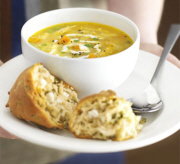
- Serving size- 1 cup (8 fl oz- 241g)
- Calories- 10
- Calories from Fat- 5
- Total Fat- 1g, 1% DV
- Saturated Fat- 0g
- Trans Fat- 0g
- Cholesterol- 0mg
- Sodium- 754mg, 31% of DV
- Total Carbohydrate- 1g, 0% DV
- Dietary Fiber- 0g
- Sugars- 1g
- Protein- 1g, 2% DV
- Vitamin A- 0% DV
- Vitamin C- 0% DV
- Calcium- 1% DV
- Iron- 0% DV
- Thiamin- 1% DV
- Riboflavin- 9% DV
- Folate- 1% DV
- Magnesium- 1% DV
- Phosphorus- 1% DV
- Potassium- 10% DV
- Copper- 1% DV
- Selenium- 2% DV

